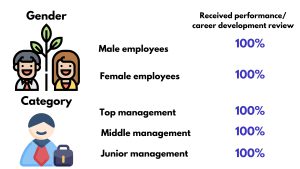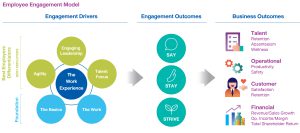Human Resources Management
“IRPC is committed to enhancing our human resource management to empower employees and achieve international recognition as the employer of choice.
| Target: | Performance: |
| Achieve 80% employee engagement. | Employee engagement reached 86% in 2023 |
Stakeholder Impact
In an increasing competitive and dynamic business environment, employees play a critical role in driving the organization towards success and continuous growth. In the face of challenges such as highly skilled employee nearing retirement, changes in work patterns after the pandemic, and digital transformation, IRPC strives to strengthen our human resources management to attract and retain talents and develop a future-ready workforce that will both drive the company’s business growth and contribute to the overall economic development. Moreover, we prioritize fair labor practices to avoid talent loss and violations of fundamental rights such as fair compensation, safe working conditions, and equal opportunities for all employees.
The company has made it a policy to constantly improve and modernize the management and human resource development in accordance with internationally recognized standards, to correspond with fast-changing technology, and to foster desirable behaviors among our employees to strive to be GOOD (good with responsibility), GREAT (great sense of business acumen) and GROWTH to success (freedom of thought and accountability leading to success), known as IRPC G3. Our goal is to empower employees as main driving force to transform IRPC into a high-performance organization, elevate our organization to international recognition among employees and stakeholders across various sectors, as well as positioning ourselves as an employer of choice for potential candidates.
Management Approach
IRPC’s human resources strategy consists of 3 components including preparing People Readiness to ensure that the company has access to skilled personnel well-attuned to current and future business plans, Reforming Organization to improve efficiency to improve work efficiency, and cultivate organizational Core Value to support the company’s new visions.
PEOPLE READINESS
Workforce Planning
IRPC implements Strategic Workforce Planning (SWP), a systematic analytical process for workforce planning in line with all business strategies to ensure that the company has at its disposal appropriately skilled personnel well attuned to existing and future business plans. To develop an organization’s talent pool, IRPC employs the following approaches:
- Create a management pool and develop their readiness to succeed retiring executives in strategic positions, such as line positions and executives in strategic positions whom IRPC assigns to assume positions under secondment in accordance with IRPC Group way of conduct with the following annual goals:
– 2022: Succession Plan N-1/N-2 & N-3
– 2023: Succession Plan N-4 & Review
: Succession Plan N-1/N-2 & N-3
– 2024: Complete Succession Plan for all levels below N-4
- Create an expert pool or a pool of specialists that are crucial for the fulfillment of the company’s vision with the following annual goals:
– 2022: Pilot Model in some areas of expertise
– 2023: Expand the scope of work units that need to create Specialists
- Create and develop Young Leaders pool and development programs to support growth and new businesses. Initially, 10 young leaders will be selected each year for a period of 3 consecutive years.
Furthermore, IRPC ensures a sustainable management of the succession plan of soon-to-be retiring employees by preparing high-performing candidates for managerial roles through the Break Through project, where they will develop their leadership skills to succeed on project management. IRPC appoints a Human Resource & Organization Effectiveness Management Committee; HOMC) and Human Resource & Organization Effectiveness Development Committee; HODC) to review manpower, succession planning, and recruitment process at all employee levels. Through annual monitoring, we have developed the competency standard and taken into account other necessary factors for sustainable succession.
Recruitment
IRPC recognizes the importance of recruiting potential candidates to foster future business growth. With the emerging future risks associated with relying on long-term employees with high expertise, it becomes imperative to recruit the next generation of talented individuals who possess the capabilities necessary for IRPC’s future success. IRPC manages the recruitment of potential candidates by combining internal talent selection with external expert sourcing, as well as nurturing talent clusters to prepare replacements for vacant positions. In addition, IRPC also supports local employment in areas where we operate to ensure that benefits are distributed to the local communities.
IRPC’s recruitment goals are set to correspond with todays’ priority to “survive” and tomorrow’s priority to “perform in the new game”, underscoring our commitment to be in the forefront of a competitive market by acquiring new talent and improving existing employee’s capabilities to meet the approach of each of the following quadrant:
|
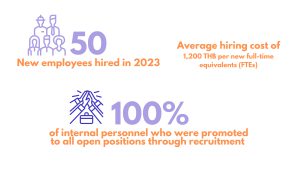
| Local Employment: | Number of employees | Share of total employee at site |
| Total employee at Rayong | 3,710 | 84.59% |
Human Capital Development
IRPC places great importance on development of skills and capabilities among all employees, with a particular focus on cultivating new skills to meet future demands, especially in areas such as data analytics and digital innovation. IRPC human resource management team is assigned to develop a benchmarking study on capacities of employees in the global companies, which allow IRPC to effectively review employees’ leadership and competencies for further enhancement, as well as prepared to train employees of different sectors to align with organizational needs through various training programs. Under this management strategy, IRPC has implemented the ACCELERATE program to reskill and upskill employees across all levels, focusing primarily on social and emotional (personal learning agility), complex cognitive (innovation, critical thinking), and digital (advanced data analysis, applied data analysis, basic digital skills).This program supports IRPC in achieving the goal of being an organization with top quartile people in order to achieve top quartile performance. In addition, the ACCELERATE program involves continuous monitoring and goal setting for employee skill development at all levels.
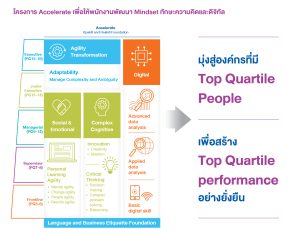
IRPC has developed a training program to promote leadership skills among senior, mid-senior executives, and senior staff to prevent business disruption in the future through the LEAD Program (for newly promoted executives) and Next program (for executive candidates). Leadership skill development training follows the Training: Coaching: Experience (10:20:70) learning approach. Consulting firms are hired to conduct training based on the “5D” Model, and training is also conducted through a Learning Management System (LMS) platform.
– 2022: Focus on education, with a test score of over 70%
– 2023: Emphasize demonstrating performance that aligns with the company’s vision by applying knowledge and skills through assignments or job rotation to prove capabilities and enhance experience in job rotation by at least 20 percent.
Human resource development expenses amounted to 31 million baht in 2023 |
Employee training hours 31.25 hoursper person per year |
Average training and development expense 7,080 THB per new full-time equivalents (FTEs) |
REFORMING ORGANIZATION
New Performance Management and Rewarding
To achieve IRPC’s sustainability goals and attain top quartile performance, IRPC emphasizes the development of employee capabilities to align with current business needs and is committed to developing long-term incentive measures for performance-based rewards. IRPC has put an emphasis on competency-based performance to drive key skills needed for new business opportunities by adjusting performance targets from KPI 60%, competency 20%, and behavior 20% to KPI 50%, competency 25%, and behavior 25%. The adjustment of performance targets will further allow the human resource team to distinguish top performing competent employees within the organization. Additionally, IRPC utilizes a rage of performance appraisal methods, including Leading and Lagging Indicators and Value Tree, and the KPI Cascading Tool. These tools provide graphical representations that illustrate the relationship between each employee’s KPIs at all levels, facilitating analysis and definition of key performance indicators.
More details of IRPC performance management approach [link]
CORE VALUE
IRPC aims to cultivate core organization’s values that facilitate essential behaviors for realizing new visions and strategic goals, encapsulated in the IRPC G3 (Good Great Growth to success). This framework consists of the following key organizational cultures and behaviors.
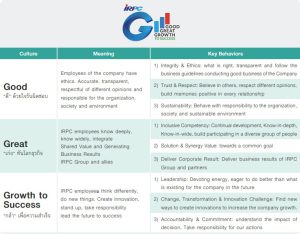
Employee Well-Being and Health Promotion
Promoting employee well-being is essential for fostering healthy, balanced lives and ensuring success in personal and professional endeavors. To provide a workplace where employees can feel deeply engaged in their work, IRPC offers industry-leading incentives and welfare benefits. In addition to the basic welfare package provided to, which includes 4 major public insurances and a congratulations and condolences program, we offer a specialized set of benefit programs tailored for life cycle to our full-time employees to ensure that they can fully engage in their work as well as satisfy their own needs in terms of life, health, and leisure activities. In 2020, IRPC also introduced a selective health insurance program, allowing employees to customize their welfare benefits their lifestyle and preferences. This initiative aims to bring balance between work and family while enhancing welfare benefits in culture, sports, leisure, family life, and self-development.
Employee Benefits
- Workplace stress management
Well-Being Education: Our seminars cover health and well-being topics, such as human rights, health and well-being, happy workplace, work-life balance and other relevant topics. They are designed to educate and support employees in mitigating health risks. We also extend invitations to our customers and suppliers to join these seminars, with recordings available for access.
- Sport & health initiatives
Fitness Programs: We provide onsite fitness centers at all our locations and organize annual events to promote physical activity among employees, including marathons and running challenges, and refinery games.
Nutrition Programs: Healthy eating is a key success factor for employees’ wellbeing. For this reason, We offer a variety of healthy food options and vegetables in the canteen, as well as fruits for break out during the meetings. In addition, we provide nutritional advice and seminars to employees, and host an annual weight loss competition.
Work Conditions
Flexible working hours: We have a policy that supports flexible working hours, as long as it can be implemented in a way that meets business requirements while also taking into account employees’ needs and changing circumstances. Moreover, we have strengthened worksite-centric support with the launch of IRPC i-connect portal for the purpose of strengthen intra-company communication.
Working-from-home arrangements: IRPC has implemented the Work from Home (WFH) practices as a normal working style, in order to ensure flexibility and adaptability and meet the demands of new generation employees. We also developed the infrastructures and network system so that employees who work from home will be able to deliver similar performance comparable to working in the office.
Family Benefits
All IRPC employees are entitled to paid parental leave, which is available to both female employees leaving for childbirth and male employees leaving for taking care of their family. Employees can also request additional personal leave for family care. IRPC also provides breast-feeding rooms at each operational site and supports employees who are pregnant or have recently had children. In addition, we provide childcare services at Bangkok office by partnering with local babysitters, thereby promoting income opportunities for locals surrounding the company. Moreover, IRPC offers comprehensive health insurance coverage for employees and their families, including spouse, children, parents, along with annual vaccinations and dental care expenses. Furthermore, we offer scholarships for employee’s children in order to promote education and well-being.
Employee Engagement
IRPC has identified 5 principles to drive employee engagement which can be categorized as Best Employers Differentiators and Foundation to capture the overall work experience. The Best Employer Differentiators engagement drivers include (1) Agility, (2) Engaging Leadership, and (3) Talent Focus. The foundation engagement drivers include (4) The Basics and 5) The Work. These principles aim to yield results in both engagement and business aspects. IRPC anticipates the following outcomes from fostering employee engagement:
| Engagement Outcomes | Business Outcomes |
|
|
Human Capital Return on Investment
Human Capital Return on Investment is a valuable tool for measuring our profitability in relation to total employee costs. By calculating this metric, which involves excluding non-employee costs from overall operating expenses and determining the resulting operating profitability, we are able to gain insights into the effectiveness of our investment in human capital, informing strategic decisions related to human resource management for future improvements.
| Human Capital Return on Investment amounted to
1.46 in 2023 |
Implementation
In 2023, IRPC invested in two human capital development projects, including the Leadership Development Program project and the i-CHEPs project. IRPC also assessed the financial impacts of these projects to determine their Return on Employee Development Investment by measuring the ratio of returns to costs and evaluating the effectiveness of the investments in employee training and development.
Employee Development Programs
| Employee Development Program / Objective | Employee Benefits | Business Benefits | Quantitative impact of business benefits (monetary or non–monetary) | % of FTEs participating in the program |
| Leadership Development Program (LEAD 3) aims to develop project management for middle management level to cost efficiency and value added. |
|
|
|
|
| Knowledge Development on Integrated Chemical Engineering (i-ChePs) program aims to upskill employees through best engineering practices, guided by qualified instructors from leading universities. Content that related to this program includes knowledge in chemical engineering which participants can apply this knowledge to improve their work. |
|
The positive impact of the learning through this program is used to improve performance at work for our employee and result in business benefits. The business benefits that derive from this program include cost reduction through higher efficiency in production by incorporating knowledge to design a better operating system in the production. | The program is expected to create more added value and reduce cost as well as improve productivity, in which participants are enabled to think more creatively and improve their problem-solving skills by applying reasoning principles. The initiative raised production efficiency and reduced energy consumption, resulting in increased net revenue through reduction of expenses for up to 176.59 million THB/year and expected to reduce 5,218 TCO2eq/year | 2 |
Performance Summary
IRPC conducts an annual employee engagement survey and uses the feedback to drive improvements in employee engagement outcomes. Our survey assesses employees’ job satisfaction, purpose, happiness, and stress. In 2023, 93% of employees participated in the survey, revealing that the organization’s employee engagement reached 83%. When benchmarked against employee engagement level of domestic and foreign companies in the same industry, IRPC demonstrated a performance in the top quartile, indicating effective efforts in enhancing employee engagement. The effectiveness of our human resources management efforts is also demonstrated by the improved turnover rates. However, IRPC remains committed to enhancing our human resources management practices by addressing feedback received from the survey, which highlights areas for improvement, such as work-life balance, compensation and benefits, and career development opportunities. In response, IRPC plans to implement flexible work arrangements, competitive compensation packages, and comprehensive career development programs to ensure that employees’ voices are valued. The survey results are also communicated to employees through internal channels such as functional meeting.
More details of IRPC performance summary [link]



 Live Stream
Live Stream